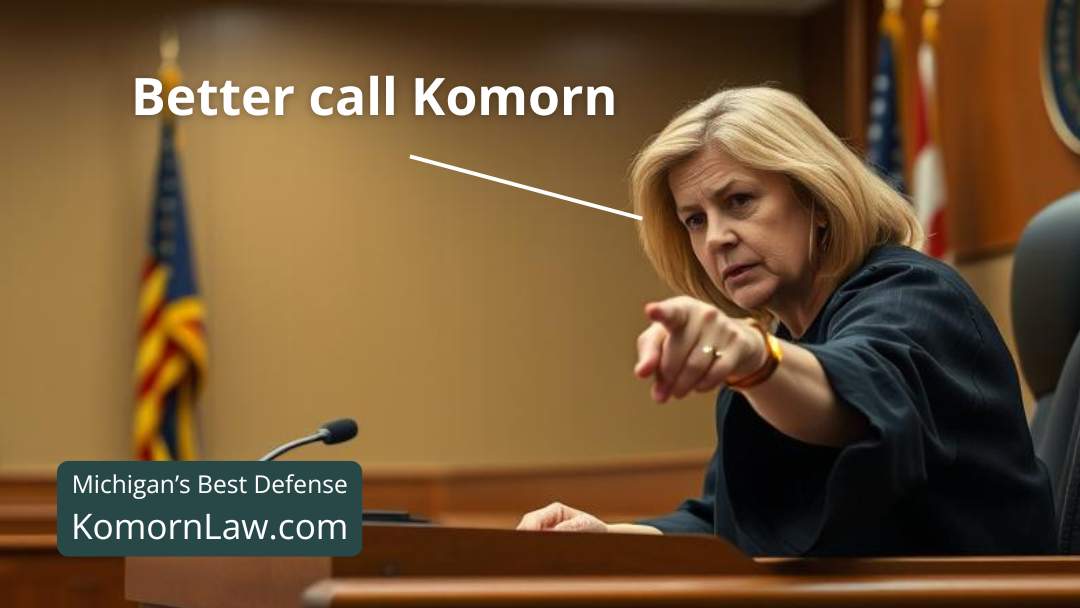I don’t need a warrant for that…
In Michigan, as in the rest of the United States, the Fourth Amendment of the fading Constitution provides individuals with protection against unreasonable searches and seizures by law enforcement.
Generally, this means that police need a warrant—issued by a judge and based on probable cause—before conducting a search.
However, there are several exceptions to the warrant requirement that allow law enforcement officers in Michigan to conduct searches without first obtaining a warrant.
Warrantless searches are subject to strict legal regulations and are typically deemed necessary in situations where acquiring a warrant is not feasible or essential.
Below are the key types of warrantless searches recognized in Michigan.
Search Incident to Lawful Arrest
One of the most common types of warrantless searches is a search incident to a lawful arrest. When law enforcement officers lawfully arrest an individual, they are permitted to search the person and the immediate area within their control without a warrant. The rationale behind this exception is to ensure officer safety and prevent the destruction of evidence. For instance, if someone is arrested in a vehicle, officers may search the person and the passenger compartment of the vehicle. However, they may not search areas beyond the arrestee’s immediate control without a warrant or another exception.
Consent Searches
Another significant exception is a consent search. If an individual voluntarily consents to a search, law enforcement officers do not need a warrant. For consent to be valid, it must be given freely and without coercion. Additionally, the person giving consent must have the authority to do so. For example, a homeowner can consent to the search of their home, but they cannot generally consent to the search of another person’s private areas within the home. If the police conduct a search based on consent, the scope of the search is limited to the area for which consent was given.
Legal Help
If you’re facing charges for a firearm offense while under the influence of alcohol or a controlled substance in Michigan, it’s essential to seek legal counsel immediately. A trained and experienced DUI attorney can provide guidance potentially helping to mitigate penalties or even challenge the charges.
Legal defense Attorney Michael Komorn is trained and certified in Field Sobriety Tests (FST), Horizontal Gaze Nystagmus and the infamous breathalyzer and has been representing clients charged with DUI and alleged crimes since 1993. Call Komorn Law 248-357-2550 when you’re ready to challenge DUI or any alleged criminal charges.
Plain View Doctrine
The plain view doctrine allows law enforcement to seize evidence without a warrant if it is in plain view. For this doctrine to apply, officers must be lawfully present in the location where they see the evidence, and its incriminating nature must be immediately apparent.
For example, if an officer is legally inside a home and sees illegal drugs on a table, the drugs can be seized without a warrant.
This doctrine does not permit officers to move or manipulate objects to gain a better view; the evidence must be plainly visible.
Exigent Circumstances
Exigent circumstances exist when there is an urgent need for action that justifies a warrantless search.
This exception applies when the situation demands immediate attention, such as when there is a threat to life, a risk of evidence being destroyed, or a potential escape of a suspect.
For instance, if officers are pursuing a suspect who flees into a building, they may enter and search the building without a warrant under the exigent circumstances exception.
Similarly, if officers hear sounds indicating that evidence is being destroyed, they may conduct a search without a warrant.
Automobile Exception
The automobile exception allows police to search a vehicle without a warrant if they have probable cause to believe it contains evidence of a crime.
The rationale behind this exception is the inherent mobility of vehicles, which could allow suspects to move the vehicle and the evidence it contains before a warrant can be obtained.
Under this exception, officers can search any part of the vehicle, including the trunk and containers within it, as long as they have probable cause.
This exception is distinct from searches incident to arrest, as it applies even when the vehicle’s occupants are not arrested.
Stop and Frisk (Terry Stops)
A stop and frisk, also known as a Terry stop, is a brief detention and pat-down of an individual by law enforcement based on reasonable suspicion that the person is involved in criminal activity and may be armed. This exception is named after the landmark Supreme Court case Terry v. Ohio (1968), which established that officers could perform a limited search for weapons without a warrant if they have reasonable suspicion. The frisk is generally limited to a pat-down of the outer clothing to check for weapons; it is not a full search of the person.
Inventory Searches
Inventory searches occur when law enforcement takes custody of a person’s property, such as after arresting someone and impounding their vehicle. The purpose of an inventory search is not to gather evidence but to protect the owner’s property, ensure officer safety, and safeguard the police from claims of lost or stolen property. Because these searches are conducted as part of standard procedures and not based on suspicion of criminal activity, they do not require a warrant. However, the search must be conducted according to established police protocols to be valid.
Schools
School officials need not obtain a warrant before searching a student who is under their authority. A search of a student need only be reasonable under all the circumstances. New Jersey v. TLO, 469 U.S. 325 (1985)
U.S. Supreme Court Ruling (Schools)
The Court did not reach this issue. As explained in the reasoning section below, the Court concluded that, under the circumstances of this case, the search of T.L.O.’s purse did not violate the Fourth Amendment to the U.S. Constitution.
The Court did not address the issue of whether unlawfully seized evidence should be suppressed in a juvenile delinquency hearing.
However, the Court decided that the Fourth Amendment applies to school officials.
Conclusion
While the Fourth Amendment generally protects against warrantless searches, several well-established exceptions allow law enforcement in Michigan to conduct searches without a warrant.
These exceptions are designed to balance the need for effective law enforcement with individuals’ rights to privacy. The legality of warrantless searches often depends on the specific circumstances and whether the situation falls within one of the recognized exceptions.
Understanding these exceptions is crucial for both law enforcement and the public, as they outline the boundaries of permissible police conduct and the protection of constitutional rights.
Related Posts
Recent

Legal Tip – Your Rights During a DUI Stop in Michigan
Komorn Law - Quick Legal TipsLegal Tip: Understanding Your Rights During a DUI Stop in Michigan A DUI stop can be stressful, but knowing your rights is crucial. You have the right to remain silent. You are not obligated to answer questions beyond basic identification....

Resisting an Unlawful Arrest in Michigan
Michigan Criminal Laws FAQs Resisting an Unlawful Arrest in MichiganThe question of whether you can legally resist an unlawful arrest in Michigan is complex, and the answer is generally no, with very limited exceptions. While the idea of defending oneself against an...
Other Articles
Legal Tip – Your Rights During a DUI Stop in Michigan
Komorn Law - Quick Legal TipsLegal Tip: Understanding Your Rights During a DUI Stop in Michigan A DUI stop can be stressful, but knowing your rights is crucial. You have the right to remain silent. You are not obligated to answer questions beyond basic identification....
Judge finds marijuana testing facilities run by ex-cops violated testing results
Viridis Laboratories has faced ongoing allegations of exaggerating THC levels while minimizing the potential risks associated with cannabis.If you are charged with a crime you're part of the State of Michigan family now. Call us - Because you don't want to be a part...
Domestic Violence Conviction Prohibits Gun Ownership
No Second Amendment Rights For YouIf you are charged with a crime you're part of the State of Michigan family now. Call us - Because you don't want to be a part of that family. Komorn Law (248) 357-2550A federal judge in Michigan has ruled that a man with a prior...
Update on Michigan’s Sick Time Act (Small Business Compliance)
Small Business Compliance Accrual Method: Employees accrue 1 hour of paid sick time forevery 30 hours worked, and unused paid sick time rolls over upto 72 hours, or 40 for a small business. Employers may limit theuse of earned sick time to 72 hours, or 40 for a small...














